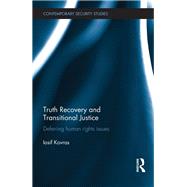- ISBN: 9780415638838 | 0415638836
- Cover: Hardcover
- Copyright: 4/28/2014
This book investigates why societies defer the solution of transitional justice issues, such as the disappeared/missing, after successful democratic consolidation. Contrary to the experience of other countries with memories of clandestine violence and missing persons, where the mobilization of the (civil) society towards truth recovery was immediate and pivotal, the societies of Cyprus and Spain remained silent for a remarkably long period of time. Critically scrutinizing the existing body of literature, the book focuses on the processes of truth recovery in Cyprus and Spain. In Cyprus, it considers the recent exhumations of mass graves containing the remains of the victims of inter-communal violence (1963-67) and the subsequent Turkish invasion (1974). In the case of Spain, it considers the civil war (1936-39) and post-war Francoist repression in Spain. It later probes the generalizability of the arguments by examining two (control) cases that followed a different trajectory from Cyprus and Spain, namely, where the silence was not prolonged either because political settlement and humanitarian issues were linked, as the case of post-Dayton Bosnia indicates, or because grassroots victims organizations successfully managed to break the silence immediately following the transition, most notably in Argentina. The book considers three interrelated issues. First, the civil societies and state elites in Cyprus and Spain remained silent for decades. What factors explain prolonged silence in transitional settings? Second, which processes can address the occasional yet puzzling transformation of victims' groups from opponents of truth recovery to vocal pro-reconciliation pressure groups? Third, under which conditions it is better to tie victims' rights to an overall political settlement? To this end the book draws upon the first worldwide database of countries with enforced disappearances as a result of political violence since 1975. It looks at the successful examples of Spain, Cyprus, Argentina and Bosnia to show how they have attempted to bring closure to deep trauma by exhuming and identifying their missing under considerably different conditions. Each case study is representative of different a approach to transitional justice. This book will be of much interest to students of transitional justice, human rights, peace and conflict studies and security studies in general.







